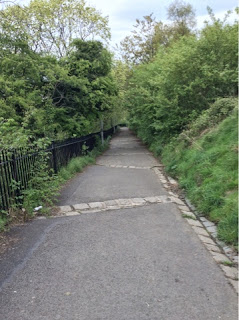2. (T/F) Hume's view was that it's occasionally more plausible to believe that a miracle (the unexplained suspension of a law of nature) has happened, than not. LH 103
3. Rousseau said we're born free but everywhere are in ____, but can liberate ourselves by submitting to what is best for the whole community, aka the _______. LH 106, 107
4. According to Millican, does Hume think we're "wrong" (as well as mistaken) to expect the future to resemble the past? PB 101
5. Which close friend of Hume's (discussed by Phillipson) spoke of an "invisible hand" reconciling private and public interests? PB 112
6. Melissa Lane says it was a paradox of civilization for Rousseau that we're in a society of plenty, but are less _____ than when we wandered naked in the glades of some barbaric past. PB 118
BONUS: Whose ex-boyfriend said the eye was proof of intelligent design?


BONUS+: Who has a "walk" in Edinburgh? Who had a dog?
BONUS++: Bertrand Russell says Hume cannot refute the lunatic who thinks he's a what?
DQ:
1. What's your reaction to the claim that nature is full of design without a designer (as reflected in the eye), complexity without a goal, adaptation and survival without any ulterior purpose? Is this marvelous or weird or grand (as in "grandeur") or what?
2. Have you encountered or directly experienced an event you would consider a "miracle" in Hume's sense of the term? Was it a "miracle on ice" when the U.S. beat the U.S.S.R. in 1980? Is it a miracle that K.C. almost won the World Series? Is it a miracle that you and I are alive? Do we need a better word for these events?
3. Do you think we should attempt to balance personal freedom with the public interest? Are taxes and other civic obligations (including voting) examples of an attempt to do that? Can anyone ever be compelled to be free? Can an individual be truly free while others remain "chained"? Would life in a "state of nature" be a form of freedom worth having? Is anti-government libertarianism a step forward or back, progress or regress? If Rand Paul had been President in the 1960s, would there have been an effective Civil Rights movement in America?
4. Are you an Inductivist? Do you regularly anticipate, worry about, plan for the events of the day? Would it be reasonable or prudent to do otherwise? What is the practical point of entertaining Humean skeptical arguments about what we can know, based on our experience? Do such considerations make you kinder and gentler, less judgmental, more humble and carefree? Or do they annoy you?
5. Do you trust the marketplace to provide justice, fairness, security, and a shot at (the pursuit of) happiness for all? Are there some things money cannot buy, but that the public interest requires us to try and provide for one another? Is there an internal mechanism ("hand") in capitalism to insure the public interest's being met? Is capitalism inherently geared to short-term private profit, not long-term public good? Can a market-oriented economy deal adequately with climate change? (On this issue, see Naomi Klein's new book This Changes Everything: Capitalism vs. the Climate.)
6. Asking again: Are you happy? Would you be happier if you had better access to health care, if college costs were lower, if career competition were less intense, if you didn't have to commute to school and work, if your neighbors were your closest friends, if your community was more supportive and caring, ...? What if any or all of that could be achieved through higher taxes and a more activist government?
Group 1-H01
ReplyDeleteFQ: Similar to _______, Hume believed that our knowledge comes from observation and experience. (LH 100)
FQ: (T/F) Hume was concerned about his death. (LH 104)
FQ: Rousseau believed that the competitive approach to life has terrible _______ effects. (LH 106)
FQ: (T/F) Rousseau's General Will is what people ought to want, not what people say they want. (LH 107)
FQ: (T/F) Hume says our assumption that we can experience things in the future as we've experience them in the past is founded on God-like insight. (PB 101)
FQ: Smith is the closest disciple that _____ ever had. (PB 111)
FQ: In what publication did Rousseau express his illumination on the sciences and the arts in 1750? (PB 117)
H01
ReplyDeleteFQ: (T/F) Like Locke, Hume believed that our knowledge comes from observation and experience. (LH 100)
FQ: (T/F) Hume's most powerful attack on the usual arguments for God's existence was published after his death. (LH 101)
FQ: Hume never openly declared that he was an ________. (LH 104)
DQ: Do you believe people's acounts of miracles?
FQ: Rousseau had many books banned by the Catholic Church because the books contained unconventional religious ideas. (LH 105)
FQ: Rousseau believed true religion came form the_____ and didn't need religious ______. (LH 106)